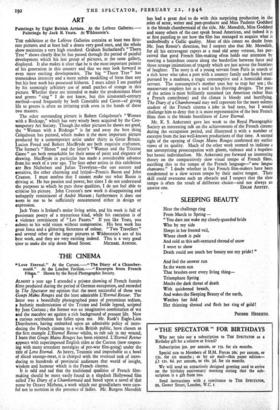THE CINEMA
14 Love Eternal." At the Curzon.—" The Diary of a Chamber- maid." At the London Pavilion.—" Excerpts from French Fills." Shown by the Royal Photographic Society.
ALMOST a year ago I attended a private showing of French featule films produced during the period of German occupation, and recorded in The Spectator my opinion that the most successful of these was Goupi Mains Rouges and the least admirable L'Eternel Retour. The latter was a beautifully photographed piece of pretentious tedium, a bathetic modernisation of the Tristan and Isolde legend, scripted by Jean Cocteau ; the former was an imaginative combination of wit and the macabre set against a rich background of peasant life. Now a curious retribution has fallen upon me. Mr. Rank's Eagle-Lion Distributors, having embarked upon an admirable policy of intro- ducing the French cinema to a wide British public, have chosen as the first example L'Eternel Retour whilst, to rub salt in my wound, I learn that Goupi Mains Rouges has been rejected. L'Eternel Retour appears with superimposed English titles at the Curzon (now reopen- ing with many attendant nostalgias of pre-war film-going) under the title of Love Eternal. As heavy, Teutonic and improbable as a bowl of sliced sausage-meat, it is charged with the eventual task of intro- ducing to hundreds of provincial audiences that world of insight, wisdom and humour which is the French cinema.
It is odd and sad that the traditional qualities of French film- making should be more easily found in a slapdash Hollywood film called The Diary of a Chambermaid and based upon a novel of that name by Octave Mirbeau, a work which our grandfathers were care- ful not to mention in the presence of ladies. Mr. Burgess Meredith has had a great deal to do with this surprising production in the roles of actor, writer and part-producer and Miss Paulette Goddard is the blonde chambermaid of the title. Mr. Meredith, Miss Goddard and many others of the cast speak broad American, and indeed it is at first puzzling to see how the film has managed to acquire what is undoubtedly a Gallic quality. Most of this comes no doubt from Mr. Jean Renoir's direction, but I suspect also that Mr. Meredith, for all his extravagant capers as a mad old army veteran, has per- ceived that good French film-making often holds our attention by steering a hazardous course along the borderline between farce and those strange intimations of tragedy which are just across the frontiers of laughter. The story is of a young servant from Paris in search of a rich lover who takes a post with a country family and finds herself pursued by a madman, a tragic consumptive and a homicidal man- servant. The consumptive's mother uses her to trap her son ; the manservant employs her as a tool in his thieving designs. The pace of the action is most brilliantly sustained (an American rather than a French contribrion) and the climax is bloody and horrifying. The Diary of a Chambermaid may well represent for the more solemn student of the French cinema a joke in bad taste, but I would challenge him to deny that it is more representative of the best French films than is the blonde beastliness of Love Eternal.
Mr. K. S. Ankersmit gave last week to the Royal Photographic Society an interesting talk on the achievements of the French cinema during the occupation period, and illustrated it with a number of excerpts from the less well-known productions of that time. A second sight of the opening of Goupi Mains Rouges confirmed my earlier views of its quality. Much of the other work seemed to indicate a not unsurprising preoccupation with gloom, violence and a hopeless but heroic individualism. Mr. Ankersmit put forward an interesting theory on the comparatively slow visual tempo of French films, ascribing this to the tempo of the French language—" une langue chantante." I doubt whether in fact French film-makers have been condemned to a slow screen tempo by their native tongue. Their skill could overcome such an obstacle and I suspect that the slow tempo is often the result of deliberate choice—and not always an






























 Previous page
Previous page